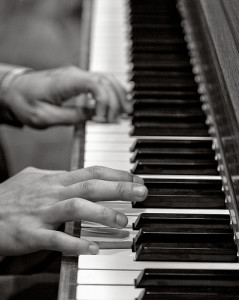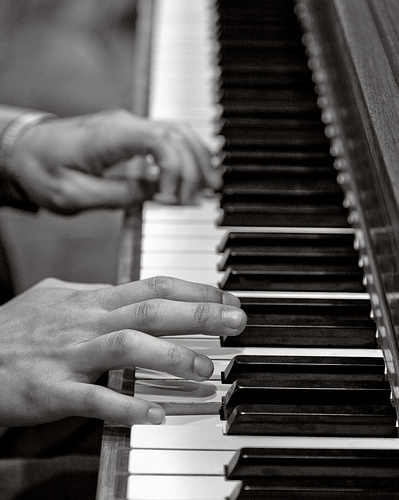 Classroom music educators are taught and encouraged to be music advocates, especially when music programs are in danger of being cut due to budget restraints. Regardless of your stance on the inclusion of music education in public schools, Independent Music Teachers are certainly advocates of music in general, and perhaps also for the rest of the arts.
Classroom music educators are taught and encouraged to be music advocates, especially when music programs are in danger of being cut due to budget restraints. Regardless of your stance on the inclusion of music education in public schools, Independent Music Teachers are certainly advocates of music in general, and perhaps also for the rest of the arts.
On nearly a daily basis, I see articles coming through my facebook feed or Pinterest feed about how “music makes you smarter.” And I have often seen “Why Study Music?” lists on piano studio websites, listing research articles that suggest that music study can improve your cognitive and social skills.
Why do piano teachers tout these articles before parents, suggesting that these are the reasons children should take piano lessons?
Let’s get real. Is that why YOU took piano lessons as a child? Because you wanted to get smarter? Is this why YOU teach piano lessons? To make children smarter?
Even if it may be true that studying music makes you “smarter,” it is not a very good reason to take lessons or encourage others to take lessons. If we are really in search of the activity that will make us or our children the smarter, then someone should do a research study to discover which activities are the best for brain development. And guess what — music might not win. Who knows — maybe chess or tennis is better for your brain. Or yoga or karate or computer programming.
The problem here is that we are confusing the VALUE of music with the SIDE BENEFITS of music study.
Yes, music study can impart important life skills such as creativity, concentration, dedication, diligence, and perseverance. But this is not why I love music. And this is certainly not why I am a piano teacher.
I daresay that most of the music advocacy that I see is dishonest and weak.
Here is an example. As much as the next person, I love an article that makes me feel good and tells me I am probably smarter than the rest of the population. 🙂 But this article is actually not that helpful to music advocacy. It suggests there is a link between music study and high achievers, but does not even attempt to describe what that connection may be. Instead of assuming that people who study music become smarter, what if the truth is that smart people often study music? And as I suggested earlier, even if music DOES have a role in making you a high achiever, this does not constitute a good reason to study music. Music should not be reduced to just another way to make your brain smarter or bolster your resume or increase your chances of getting into college.
Here are two articles that I think every piano teacher should read carefully:
- “We Need More Honesty In Music Advocacy,” by Chad Twedt. This article discusses the problems with music advocacy today and presents ways to identify the weakness and fallacies made in music advocacy today. At the end, Chad also gives suggestions for better music advocacy. It is well worth your time to carefully read this lengthy but thorough article.
- “Unconvincing Arguments for Music Education,” by Elissa Milne. This article examines three commonly used reasons when arguing for the place of music education in schools.
What IS the value of music? Why am I a piano teacher? These are important things for each of us to ponder.
Correct me if I am wrong, but I think we make music and teach music simply because we love music. And we love music because it is beautiful.
I believe in music for music’s sake. I believe that there is something magical about learning how to create beautiful sounds. I believe music is a wonderful and powerful way for humans to communicate feelings, emotions, and stories with others.
What does honest music advocacy look like? I would love to see more stories about how music has made a difference in people’s lives or improved their quality of life. What would you like to see? Why are YOU a piano teacher?
Photo Credit: CC by Robert Couse-Baker



I am also a piano teacher and I say AMEN to this blog!! I took piano when I was little because it was magical and opened up a whole new world for me. And now I teach piano because I want to share the magic with everyone willing to learn it. There is nothing more satisfying than watching a little one get excited about music and learning music!
Cheri
http://pianobycheri.blogspot.com/
Excellent. You covered one point I did not mention (but should have mentioned) in my advocacy article, which is the rhetorical, “Why did YOU take piano lessons?” question. There is a huge disconnect between the real reasons people study music vs. the stated reasons. This would suggest perhaps a kind of internal guilt, like maybe everyone knows deep down that we study music out of selfish indulgence to experience one of the most beautiful things this world has to offer, but somehow this line of reasoning isn’t good enough to promote. Or perhaps it’s the conditioning of today’s audience by our media to expect that everything we do should be backed by a study into emotional, physical, cognitive and financial benefits. I do like that people today try to be more informed about things and do pay attention to research (this is a good thing), but the funding of music programs doesn’t need this justification and in fact is better off without it. Those who say we need this external justification for music aren’t doing a good enough job of conveying the real reasons why music should be studied.
Thanks, Chad! I agree — paying attention to research is a good thing and so is being aware of the side benefits of music study. The problem occurs when music study is justified using those side benefits.
It is interesting to consider why the pursuit of beauty (whether in visual arts or aural arts) is overlooked or bypassed as part of the value of the arts. It seems like a worthy pursuit to me.
Another line of reasoning I like (this one is from your article) is the one about music being an important, cross-cultural discovery. As humans, we are and should be continuing to try to understand the world around us. This is why we all study some level of science, math, English, history, art, music, etc. So often, the justification we hear for certain subjects is financial gain (i.e., what is practical for me to be able to make money someday). Being able to make a living is certainly important, but so is being an educated, knowledgeable human being. The idea is that not everyone will become an expert in every subject area, but every human should at least have some idea about what each subject area is about.
Just had a long discussion about this last night! I agree completely with your points in this article. As a piano teacher, I teach to share the magic of creating something beautiful with my students. I believe that every child and every adult should be able to understand and enjoy the language of music! To me it doesn’t matter what type of music – just that they are creating music to express themselves.
This topic recently came up at a parent’s night at my daughter’s high school – the choral director boldly spoke up on this very topic in his introductory comments. As a parent and a piano teacher, I was thinking, “bravo!” Sometimes I still slip into a second row mindset, a defensive position as to why my field of teaching is as professional as the math/science//English professional educators’ subject matter. For its mystic beauty and especially in the unexplainable moments of joy in our teaching and in our listening, music IS worthy on its own, no comparisons, no contrasts!
My wife and I had a conversation on this subject just last night. I’ve always been uncomfortable about preaching this “music makes you smarter” message and now I know why. Thanks for being willing to go against the flow and get back to the real reason music enriches our lives.
High five to this blog! I teach piano because I love music. Listening to music is not the same as being able to actually play music. My goal as a teacher is to instill the love of music in my students, and I am successful 99% of the time. I am still working on the other 1%! Playing the piano allows me to express whatever emotion I am feeling at the time. It alleviates stress, burns off nervous energy, calms my soul, and expresses my heart. This is why I teach piano lessons and this is what I pass on to my students.
Right on. Musicality is one of Howard Gardner’s theory of multiple intelligences. Study music because you like music. I look forward to the day when students study math to improve their musicianship just as I also want to live long enough to watch football players come out and do the half time entertainment in a concert.
People want to know what is “in it” for them. And so I too have fallen into the trap of talking about how learning music may improve coordination, concentration, and even , indeed, make you smarter. Somehow saying how learning music allows emotions to blossom, the appreciation of beauty to grow, and/or offers magical moments of sheer wonder just does not work in this material world of ours. Yet, in fact it does work. I certainly do not teach piano for any other reason that the one…I love it. Thank you for this blog. I needed to be reminded!
Joy – love this post. I have been barking about this for years. Just recently a new study called Muting the Mozart Effect (http://ow.ly/rIPvp) was published to which I tweeted “now what?” We could see this coming years ago. I had the pleasure of meeting Fran Rauscher who started this whole ball of wax way back in the early 90’s. She knew even then that her research was being manipulated and worse, misconstrued by the ‘save the music’ folks and intimated that sort of campaign would ultimately do more harm than good. She was spot on. So what do we do to ‘save music’? How about creating more entrepreneurial businessmen and women in the field of music education? These folks will be trained to meet the growing demand of a huge demographic – that is everyone who is NOT in a band, choir, or orchestra program between the ages of 12 and 18. We have done a woefully terrible job of training future music educators for jobs that are dwindling…but, technology can help and today’s savvy teachers and learners know that access to info is key (no pun intended). I remain hopeful that the profession can thrive both in academia and in communities who support great teachers and teaching facilities run as for-profit businesses.